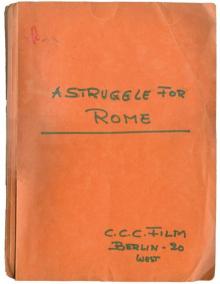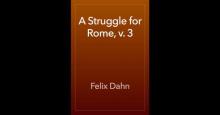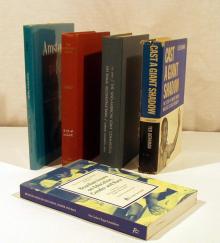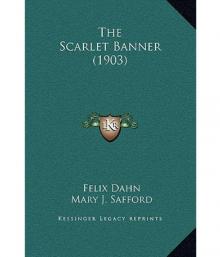- Home
- Felix Dahn
A Struggle for Rome v. 1 Page 6
A Struggle for Rome v. 1 Read online
Page 6
CHAPTER VI.
Theodoric's bed-chamber, which had served the same purpose under theEmperors, was decorated with the heavy splendour of late Roman style.
The superabundant reliefs of the walls and the gilded ornamentation ofthe ceiling still pictured the victories and triumphal processions ofRoman consuls and emperors. Heathen gods and goddesses floated proudlyabove. Everywhere reigned the same oppressive magnificence.
The extreme simplicity of the Gothic King's couch formed a remarkablecontrast to all this pomp.
The oval frame of unpolished oak was raised scarcely a foot from theground, and contained few cushions. Only the costly crimson coverwhich hid the King's feet, and the lion's skin with golden clawsthat lay before the bed--a present from the King of the Vandals, inAfrica--betrayed the royalty of the sick man. All the other furnitureof the room was simple, plain, and almost barbarously clumsy.
On a pillar in the background hung the iron shield and broad-sword ofthe King, which had not been used for many years. At the head of thebed stood the old master-at-arms, with his eyes bent down, anxiouslyexamining the features of the patient, who, leaning on his left arm,turned his majestic countenance towards him.
The King's sparse hair, rubbed off on the temples by years of frictioncaused by his heavy helmet, was still of a bright brown colour, andwithout a trace of grey. His heavy brow, sparkling eyes, large nose,and the deep lines in his cheeks, spoke of great tasks and greatstrength to accomplish them.
The expression of his face was commanding and even sublime; butthe benevolent softness of his mouth, in spite of the grim andslightly-grey beard, gave evidence of the mildness and peaceful wisdomby means of which he had raised his kingdom to such a flourishingcondition that it had already become a proverb and celebrated in story.
His golden-brown and piercing eyes rested for some time upon hisgigantic sick-nurse, with an expression of love and favour.
At last he stretched out his thin, but nervous, right hand.
"Old friend," said he, "we must now take leave of each other."
The old man sank upon his knees and pressed the King's hand to hisbroad breast.
"Come, my friend, rise! Must I comfort _thee_?"
But Hildebrand remained upon his knees, and only lifted his head sothat he could look the King in the face.
"See," said the King, "I know that thou, son of Hilding, hast receivedfrom thy ancestors and thy father a deeper knowledge of the ailings ofmankind and their healing than all these Grecian physicians and Lydianquack-salvers. And, more than that, thou art sincere. Therefore, I begthee honestly to confirm me in what I feel to be true. Tell me, must Inot die to-day--even before the night?" And he looked at him in amanner that would brook no deception.
But Hildebrand did not wish to deceive him; he had regained his naturalcomposure.
"Yes, King of the Goths, heir of the Amelungs, thou must die; the handof Death has passed across thy brow. Never again wilt thou see thesun's setting."
"It is well," said Theodoric, without blenching. "Seest thou, the Greekwhom I dismissed has lied to me all the day long. And yet time isprecious to me."
"Wilt thou again send for the priests?" asked Hildebrand reluctantly.
"No; they can do me no good. I need them no more."
"Sleep has strengthened thee, and lifted the veil from thy soul. Hail!Theodoric, son of Walamer! thou wilt die like a hero!"
"I know," said the King, smiling, "that it was repugnant to thyfeelings to see the priests near my couch. Thou art in the right. Theycannot help me."
"And now--who or what has helped thee now?"
"God and myself. Hear! And what I am about to say are my parting words.In gratitude for thy fifty years' faithful service, I confide to thineear alone--not to my daughter, and not to Cassiodorus--that which hasso long troubled me. Tell me, what is reported among the people? Whatis believed was the cause of the melancholy which suddenly overcame me,and originated this disease?"
"The Italians say that it was remorse for the death of Boethius andSymmachus."
"Didst thou believe this?"
"No; I could not believe that the death of traitors could so affectthee."
"Thou art in the right. Perhaps, according to law, they were notdeserving of death; and I loved Boethius much. But they were traitors athousand times! Traitors in their thoughts, traitors to my trust, to myheart. I prized these Romans more than the best of my people. And theyshowed their gratitude by wishing that my crown were the Emperor's;they wrote flattering letters to the Byzantines; they preferred aJustinus and a Justinian to the friendship of a Theodoric! I am notsorry for them; I despise them. Guess again. What didst thou believe?"
"King, thy heir is a youth, and enemies encompass thy throne."
The sick man frowned.
"This time thou art nearer the mark. I always knew the weakness of mykingdom. When at the evening banquet I have shown the proud face ofconfidence to the foreign ambassadors, at night I have anxiously sighedat its inward disease. Old man, I know that thou hast often consideredme all too confident. But none might see me tremble, neither friend norfoe. Else my throne had trembled. I sighed only when alone, and haveborne my care in solitude."
"Thou art wisdom itself, my King, and I was a fool!" cried the old man.
"Thou seest," continued the King, stroking the old man's hand, "that Iknew in what I displeased thee. I knew also thy blind hatred of theseItalians. Believe me, it _is_ blind, as was, perhaps, my love of them."Here he stopped and sighed.
"Why wilt thou distress thyself?"
"No, let me continue! I know that my kingdom--the work of my gloriousand toilsome life--may easily fall. Perhaps owing to my generosity tothese Romans. Be it so! No work of man is eternal, and the error ofover-kindness is easily borne!"
"My great King!"
"But, Hildebrand, one night, as I was lying awake, anxious about thedanger of my kingdom, there rose before my soul the ghost of anothersin! Not of too much kindness, but of bloody force! And woe, woe to me,if my nation is to be destroyed in expiation of the crime of Theodoric!His, _his_ image rises before me!"
The sick man spoke with difficulty, and lay for a moment overwhelmedwith emotion.
"Whose image? of whom dost thou speak?" asked the old man softly,bending over him.
"Odoacer!" whispered the King, and Hildebrand bowed his head.
At last Theodoric broke the painful silence.
"Yes, old friend, this right hand, as thou knowest, struck down themighty hero--my guest--at the banquet-table. His hot blood splashedinto my face, and an ardent hate flashed upon me from his filming eyes.A few months past, during the night I speak of, his bloody, pale andangry form rose before me like an avenging god. My heart wascontracted, my pulses beat with fever. The fearful conviction came overme that my kingdom would fall and my nation decay, because of this mybloody deed."
This time, after a short pause, Hildebrand, looking up defiantly, said:
"King, why dost thou fret like a woman? Hast thou not struck downhundreds with thine own arm, and thy people thousands at thy behest?Have we not descended from the mountains into this land in more thanthirty battles, wading ankle-deep in blood? What is the blood of _one_man to all this? And remember the circumstances. For four years he haddefied thee as the ure-ox defies the bear. Twice he had driven thee andthy folk to the brink of destruction. Hunger, sword, and pestilencecarried off thy Goths. At last, at last, stubborn Ravenna fell, forcedby famine. The deadly enemy lay at thy feet. Then a warning came thathe contemplated treason; that he would renew the fearful strife; thathe would attack thee and thine that night. What couldest thou do? Callhim openly to account? If he were guilty, that could do no good,therefore thou wert beforehand with him, and did that to him in theevening which he intended doing to thee at night. That _one_ deed savedthy people, and prevented the renewal of a fearful strife. Thouforgavest all his followers, and for thirty years caused Goths andItalians to live as if in Paradise. And now tho
u wilt torment thyselfwith vain remorse? Two nations will ever thank thee for this deed! I--Iwould have killed him seven times over!"
The old man ceased; his eyes flashed; he looked like an angry giant.But the King shook his head.
"That is nothing, old warrior! I have repeated the same thing to myselfa hundred times, and put it into more flattering forms than is possibleto thy rude tongue. All in vain! He was a hero--the only one of mykind--and I murdered him without proof of his guilt, for I was jealous,suspicious, aye, it must be said, I was _afraid_--afraid that I shouldbe compelled again to strive with him. It was, and is, and ever willbe a sin! I have found no peace in self-excuses. Since that nighthis image has followed me unceasingly. At the banquet and in thecouncil-chamber; at the hunt, in the church, waking and sleeping. ThenCassiodorus sent the priests and bishops to me. They could not help me.They heard my confession, saw my grief and my faith, and absolved mefrom all my sins. But peace came not, and though they forgave me, Icould not forgive myself. I know not whether it be the old manner ofthought inherited from my heathen ancestors, but I cannot hide myselfbehind the Cross from the ghost of the murdered man! I cannot believe Iam freed from my bloody deed by the blood of an innocent God who diedupon the Cross!"
Hildebrand's face was suddenly lit up with joy.
"Thou knowest," he whispered in the King's ear, "that I could neverbelieve the priests of the Cross. Speak, oh, speak! dost thou stillbelieve in Thor and Odin? Have _they_ helped thee?"
The King smiled and shook his head.
"No, thou incorrigible old heathen! Thy Walhalla is nothing for me.Hear how I was helped. Yesterday I sent the bishops away, and retiredinto the recesses of my own heart. I thought and wrestled and entreatedGod, and I became calmer, and, behold! in the night a deep slumber cameupon me, such as I had not known for long months. When I awoke, nofever of torture shook my limbs; I felt composed, and my mind clearer;I felt that no grace or miracle of God could undo the deed that I hadcommitted. I knew that if God be indeed a God of vengeance, He couldpunish me and my house unto the seventh generation, and I dedicatedmyself and my kingdom to His eternal vengeance. But, if God be just, Hecannot visit the sins committed by their King upon the people of theGoths. No, He will not do that. And if ever this people decay, I feelthat it will not be owing to my deed; and thus peace hath entered intomy soul, and I can die with courage."
He was silent, but Hildebrand bowed his head and kissed the hand whichhad killed Odoacer.
"These are my parting words to thee, my legacy and thanks for a wholelife of fidelity. Now let us dedicate the remaining time to the Goths.Come, assist me to rise, I cannot die amid these cushions. There hangmy weapons! Give them to me! No objections! I will, and I can!"
Hildebrand was obliged to obey. With his help the sick man rose, andthrew a purple mantle over his shoulders, girded on his sword, set thelow helmet-crown on his head, and supporting himself on the shaft ofhis heavy lance, leaned his back against the thick Doric column in themiddle of the room.
"Now call my daughter, and Cassiodorus, and whoever else may beoutside."

 A Struggle for Rome, v. 2
A Struggle for Rome, v. 2 A Struggle for Rome, v. 3
A Struggle for Rome, v. 3 Bissula. English
Bissula. English The Scarlet Banner
The Scarlet Banner Felicitas: A Tale of the German Migrations: A.D. 476
Felicitas: A Tale of the German Migrations: A.D. 476